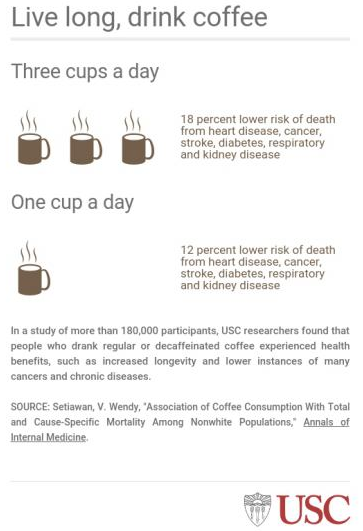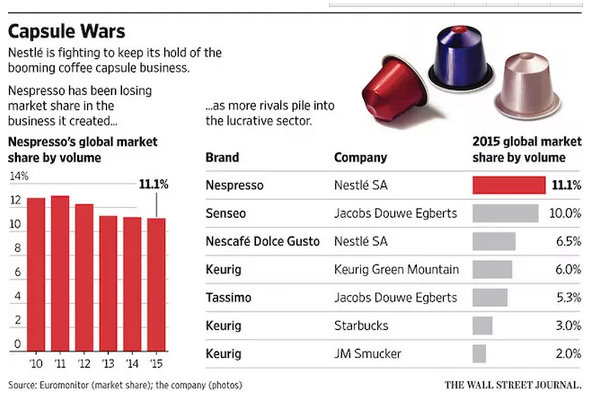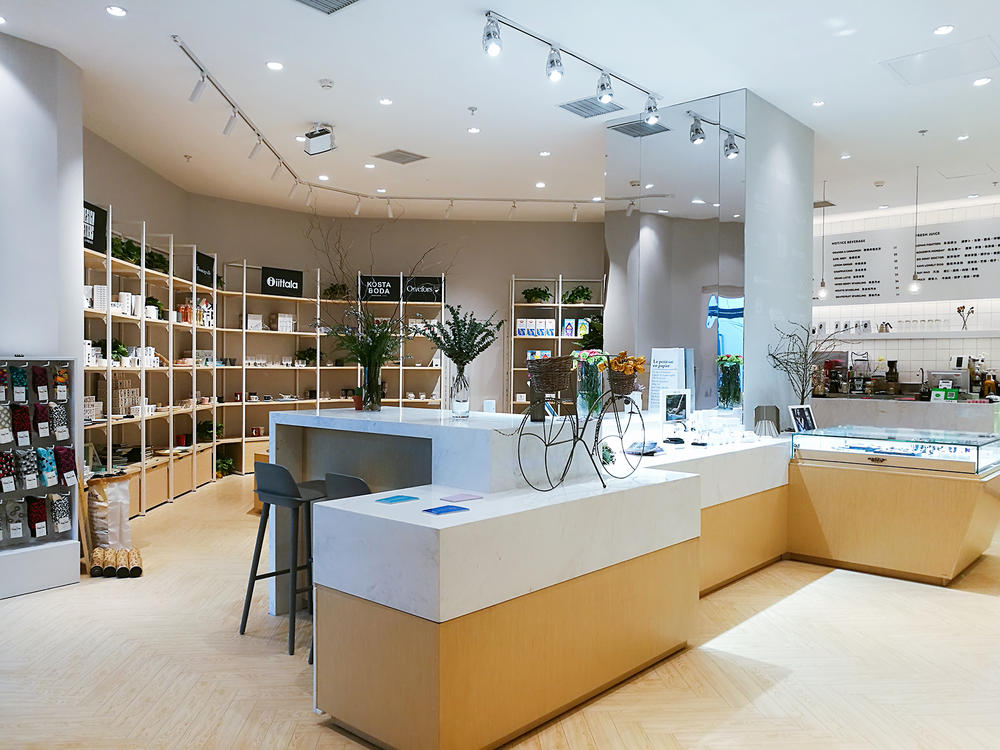Refill = renew your life? Coffee drinkers reduce the death rate by 12%!
Professional barista communication, please pay attention to coffee workshop (Weixin Official Accounts cafe_style )
In a study of more than 180,000 participants, researchers at the University of Southern California found that people who regularly drank regular coffee, or decaffeinated coffee, were healthier, lived longer, for example, and were less likely to develop many cancers and chronic diseases. Now we have another reason to start the day with a cup of coffee. Scientists have found that coffee drinkers seem to live longer.
Coffee drinking was associated with a lower risk of death from heart disease, cancer, stroke, diabetes and respiratory and kidney disease in a study of African-American, Japanese-American, Hispanic and Caucasian Americans.
Those who drank one cup of coffee a day were 12 percent less likely to die than those who did not drink coffee. The association was even stronger among people who drank two to three cups of coffee a day--an 18 percent reduction in mortality.
Veronica W. Setiawan, associate professor of preventive medicine at the University of Southern California's Keck School of Medicine and lead author of the study, said: "We're not going to do anything about it. Setiawan said: "Mortality was lower whether participants drank regular or decaffeinated coffee, suggesting that this association is not coffee dependent and therefore exists." Although we can't say that drinking coffee prolongs life, we see this correlation. If you like coffee, drink it! If you don't drink coffee, you need to think twice about whether to start."
The work, published July 11 in Annals of Internal Medicine, is a multiracial cohort study conducted in collaboration with the University of Hawaii Cancer Center and the University of Southern California Keck School of Medicine.
The ongoing Multiethnic Cohort Study, which includes more than 215000 participants, is the most ethnically diverse of all studies analyzing lifestyle risk factors for cancer so far.
"Until now, there has been little data on the association between coffee intake and mortality in nonwhite populations, both in the United States and elsewhere," the authors note in the paper. However, these studies are important because there are significant differences in lifestyle and disease risk among people of different races and ethnic backgrounds. What researchers find in one group does not necessarily apply to others.“

"As the largest study of its kind to date, this work included four ethnic groups with very different lifestyles, but all reached similar conclusions, suggesting that there is a common biological basis behind this phenomenon." As a result, setiawan argues,"coffee is good for you whether you're white, african american, latino or asian."
Benefits of Coffee
Scientists from the University of Southern California and other institutions have previously found that coffee drinking is associated with a reduced risk of cancer, diabetes, liver disease, Parkinson's disease and other chronic diseases.
Setiawan himself drinks 1- 2 cups of coffee a day, and he believes that since many people like to drink or rely on coffee every day, any positive effects from drinking coffee will be far-reaching.
"Coffee is rich in antioxidants and phenolic compounds, which play an important role in cancer prevention," Setiawan said."Although the study did not include Caucasians and did not identify specific chemicals in coffee that contribute to longevity, it is clear that coffee can be added to the list of healthy diets and lifestyles."
According to the National Coffee Association, about 62 percent of Americans drink coffee daily, up 5 percent from 2016.
As a research institution, USC scientists have been collaborating across disciplines to find cures for cancer and better disease management.
The Keck School of Medicine and the Norris Comprehensive Cancer Center at the University of Southern California jointly manage a state database called the Los Angeles Cancer Surveillance Program, which provides scientists with basic cancer statistics for multiple ethnic groups.
Coffee drinking may reduce the risk of colorectal cancer, but drinking hot coffee or beverages may lead to esophageal cancer, researchers found.
Voice from WHO
In some ways, coffee is regaining its reputation as "healthy." Twenty-five years after coffee was identified as a bladder cancer-related carcinogen, the World Health Organization (WHO) announced last year that coffee consumption reduces the risk of liver and uterine cancer.
"Some people worry that drinking coffee may be harmful to health because it may increase the risk of heart disease, growth retardation, stomach ulcers and heartburn, but research shows that coffee is not harmful to people's health in the vast majority of cases." Setiawan said.
Coffee related numbers
Setiawan and colleagues looked at data on 185855 subjects aged 45 to 75, including 17 percent African-American, 7 percent Native Hawaiian, 29 percent Japanese-American, 22 percent Latino, and 25 percent white. Participants received questionnaires about diet, lifestyle, family and personal disease history.
Participants reported their coffee drinking habits in the survey, updating them about every five years. Participants chose from nine options ranging from "never/hardly ever" to "four or more cups per day" and also stated whether the coffee they drank contained caffeine. Participants were followed for an average of 16 years.
Sixteen percent said they never drank coffee, 31 percent said they drank one cup a day, 25 percent said they drank two to three cups a day, 7 percent said they drank four or more cups, and the remaining 21 percent said they did not drink coffee regularly.
During follow-up, 58397 participants (31%) died, with cardiovascular disease (36%) and cancer (31%) being the leading causes of death. The data were adjusted for age, sex, race, smoking habits, education level, pre-existing diseases, physical activity and alcohol intake.
Setiawan has found in previous studies that coffee reduces the risk of liver cancer and chronic liver disease. Now she is assessing how coffee correlates with the risk of developing certain types of cancer.
Important Notice :
前街咖啡 FrontStreet Coffee has moved to new addredd:
FrontStreet Coffee Address: 315,Donghua East Road,GuangZhou
Tel:020 38364473
- Prev

Nestle Coffee capsule faces more and more challenges
Recently, Nestl é finally abandoned its insistence on selling Nespresso coffee capsules only in its own stores and agreed to work with a German supermarket chain to sell coffee capsules. There are three cooperative supermarkets: Saturn, MediaMarkt and GaleriaKaufhof. In these three supermarkets, customers will see a terminal named N-Point. After the machine selects the capsule to buy, the machine will print out
- Next

Put Scandinavia into 350 coffee shops and 50 trendy brands allow consumers to shop while drinking coffee.
Li Xuesong, founder of ◆ FIKAFIKA, is the rotating chairman of China's Nordic Salon this year. For the exchange of professional baristas, please follow the article from the coffee workshop (Wechat official account cafe_style). Chu Linbing, a pencil-way reporter, is far away from northern Europe, so far that he can only like it in a circle of friends. Nordic Europe is also very close, close to this coffee shop around the corner. Li Xuesong wrote a small poem the year before last, the protagonist of the poem
Related
- Workers collapse! Lucky suspects that it will introduce freshly cut fruits?!
- 1-point subsidy recipients wear thousand-yuan watches?! Local response: For low-income households
- Can lightly roasted coffee beans be used to extract espresso? How finely should you grind high-quality coffee beans to make Italian latte?
- What is the difference between the world's top rose summer coffee and Yejia Shefi? What are the flavor characteristics of Yega Shefi coffee and Panama rose summer?
- The ceremony is full! Starbucks starts to cut the ribbon at a complimentary coffee station?!
- A whole Michelin meal?! Lucky launches the new "Small Butter Apple Crispy Latte"
- Three tips for adjusting espresso on rainy days! Quickly find the right water temperature, powder, and grinding ratio for espresso!
- How much hot water does it take to brew hanging ear coffee? How does it taste best? Can hot water from the water dispenser be used to make ear drip coffee?
- What grade does Jamaica Blue Mountain No. 1 coffee belong to and how to drink it better? What is the highest grade of Blue Mountain coffee for coffee aristocrats?
- What are the flavor characteristics of the world-famous coffee Blue Mountain No. 1 Golden Mantelin? What are the characteristics of deep-roasted bitter coffee?

